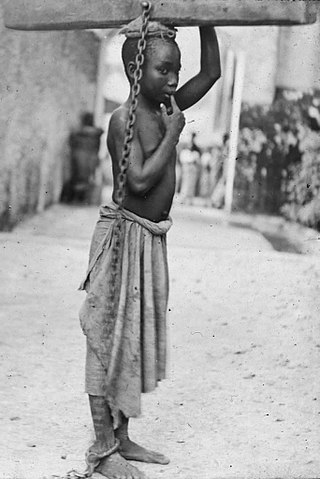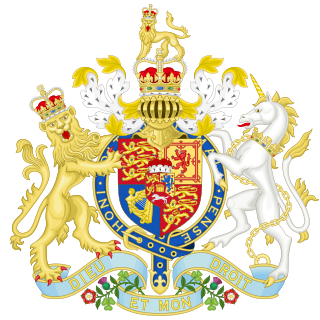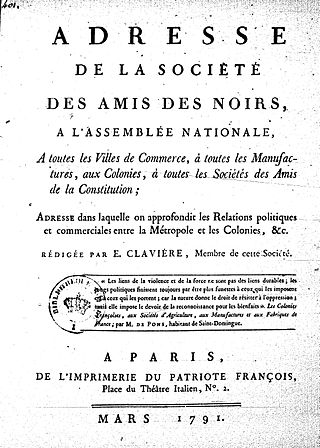
Abolitionism, or the abolitionist movement, is the movement to end slavery and liberate enslaved people around the world.

The Slave Trade Act 1807, officially An Act for the Abolition of the Slave Trade, was an Act of the Parliament of the United Kingdom prohibiting the slave trade in the British Empire. Although it did not abolish the practice of slavery, it encouraged British action to press other nation states to abolish their own slave trades. It took effect on 1 May 1807, after 18 years of trying to pass an abolition bill.

Victor Schœlcher was a French abolitionist, writer, politician and journalist, best known for his leading role in the abolition of slavery in France in 1848, during the Second Republic.

The Slavery Abolition Act 1833 was an Act of the Parliament of the United Kingdom which provided for the gradual abolition of slavery in most parts of the British Empire. It was passed by Earl Grey's reforming administration and expanded the jurisdiction of the Slave Trade Act 1807 and made the purchase or ownership of slaves illegal within the British Empire, with the exception of "the Territories in the Possession of the East India Company", Ceylon, and Saint Helena. The Act came into force on 1 August 1834, and was repealed in 1998 as a part of wider rationalisation of English statute law; however, later anti-slavery legislation remains in force.

Slavery in the British and French Caribbean refers to slavery in the parts of the Caribbean dominated by France or the British Empire.

The Society of the Friends of the Blacks was a French abolitionist society founded by Jacques Pierre Brissot and Étienne Clavière and directly inspired by the Society for Effecting the Abolition of the Slave Trade founded in London in 1787. The society's aim was to abolish both the institution of slavery in the France's overseas colonies and French involvement in the Atlantic slave trade.

The history of slavery spans many cultures, nationalities, and religions from ancient times to the present day. Likewise, its victims have come from many different ethnicities and religious groups. The social, economic, and legal positions of slaves have differed vastly in different systems of slavery in different times and places.

The Society for Effecting the Abolition of the Slave Trade, also known as the Society for the Abolition of the Slave Trade, and sometimes referred to as the Abolition Society or Anti-Slavery Society, was a British abolitionist group formed on 22 May 1787. The objective of abolishing the slave trade was achieved in 1807. The abolition of slavery in all British colonies followed in 1833.

The abolition of slavery occurred at different times in different countries. It frequently occurred sequentially in more than one stage – for example, as abolition of the trade in slaves in a specific country, and then as abolition of slavery throughout empires. Each step was usually the result of a separate law or action. This timeline shows abolition laws or actions listed chronologically. It also covers the abolition of serfdom.

Slavery in Britain existed before the Roman occupation and until the 11th century, when the Norman conquest of England resulted in the gradual merger of the pre-conquest institution of slavery into serfdom, and all slaves were no longer recognised separately in English law or custom. By the middle of the 12th century, the institution of slavery as it had existed prior to the Norman conquest had fully disappeared, but other forms of unfree servitude continued for some centuries.

The French Law of 20 May 1802 was passed by Napoleon Bonaparte that day, revoking the Law of 4 February 1794 which had abolished slavery in all the French colonies. However, the 1794 decree was only implemented in Saint-Domingue, Guadeloupe and Guiana, did not take effect in Mauritius, Reunion and Martinique, the last of which had been captured by the British and thus was unaffected by French law. The law of reintroducing slavery in France was an integral part of the Napoleonic Code.

The Code noir was a decree passed by King Louis XIV of France in 1685 defining the conditions of slavery in the French colonial empire and served as the code for slavery conduct in the French colonies up until 1789 the year marking the beginning of the French Revolution. The decree restricted the activities of free people of color, mandated conversion to Catholicism for all enslaved people throughout the empire, defined the punishments meted out to them, and ordered the expulsion of all Jewish people from France's colonies.
Serfdom has a long history that dates to ancient times.

Abolitionism in the United Kingdom was the movement in the late 18th and early 19th centuries to end the practice of slavery, whether formal or informal, in the United Kingdom, the British Empire and the world, including ending the Atlantic slave trade. It was part of a wider abolitionism movement in Western Europe and the Americas.
The Laws of 18 and 19 July 1845, commonly known as Mackau Law are a set of laws which paved the way towards the abolition of slavery in France. They were instigated by Ange de Mackau, then Minister of the Navy and of Colonies. Effective abolition was enacted with the Decree abolishing Slavery of 27 April 1848.

The planter class was a racial and socioeconomic caste which emerged in the Americas during European colonization in the early modern period. Members of the caste, most of whom were settlers of European descent, consisted of individuals who owned or were financially connected to plantations, large-scale farms devoted to the production of cash crops in high demand across Euro-American markets. These plantations were operated by the forced labour of slaves and indentured servants and typically existed in tropical climates, where the soil was fertile enough to handle the intensity of plantation agriculture. Cash crops produced on plantations owned by the planter class included tobacco, sugarcane, cotton, indigo, coffee, tea, cocoa, sisal, oil seeds, oil palms, hemp, rubber trees, and fruits. In North America, the planter class formed part of the American gentry.
William Fox was a radical abolitionist pamphleteer in late 18th-century Britain. Between 1773 and 1794 he ran a bookshop at 128 Holborn Hill in London; from 1782 he was in a business arrangement with the Particular Baptist Martha Gurney, who printed and sold his and others' pamphlets.
Slavery in France, and by extension, the French Empire, covers a wide range of disparate topics. Some of the most notable ones include:

The Law of 4 February 1794 was a decree of the French National Convention which abolished slavery in all French colonies.

Slavery is noted in the area later known as Algeria since antiquity. Algeria was a center of the Trans-Saharan slave trade route of enslaved Black Africans from sub-Saharan Africa, as well as a center of the slave trade of Barbary slave trade of Europeans captured by the barbary pirates.









